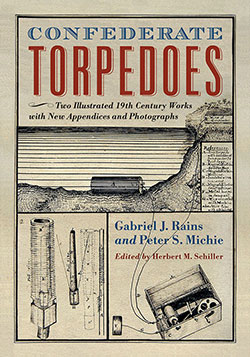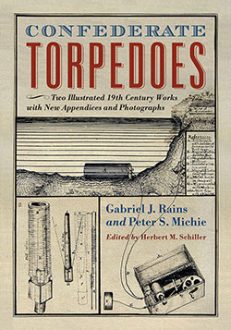Confederate Torpedoes
Two Illustrated 19th Century Works with New Appendices and Photographs
$39.95
In stock
About the Book
Hoping to deter the Union navy from aggressive action on southern waterways during the Civil War, the Confederacy led the way in developing “torpedoes,” a term that in the nineteenth century referred to contact mines floating on or just below the water’s service. With this book, two little-known but important manuscripts related to these valuable weapons become available for the first time. General Gabriel J. Rains, director of the Confederate Torpedo Bureau, penned his Torpedo Book as a manual for the fabrication and use of land mines and offensive and defensive water mines. With 21 scale drawings, Notes Explaining Rebel Torpedoes and Ordnance by Captain Peter S. Michie documents from the Federal perspective the construction and use of these “infernal machines.” A detailed accounting, by the editor, of the vessels sunk or damaged by Confederate torpedoes and numerous photographs of existing specimens from museums and private collections complete this significant compilation.
About the Author(s)
Bibliographic Details
Gabriel J. Rains and Peter S. Michie
Format: softcover (7 x 10)
Pages: 220
Bibliographic Info: 166 photos, appendices, notes, bibliography, index
Copyright Date: 2011
pISBN: 978-0-7864-6332-9
eISBN: 978-0-7864-8545-1
Imprint: McFarland
Table of Contents
Acknowledgments ix
Preface xi
I. Gabriel J. Rains
Biographical Introduction 3
Editorial Notes 9
Contents and Plates 10
Torpedo Book 13
II. Peter S. Michie
Biographical Introduction 93
Editorial Notes 97
Contents 98
Notes Explaining Rebel Torpedoes and Ordnance as Shown in Plates Nos. 1 to 21 Inclusive 99
Editor’s Appendix 1: Vessels Sunk or Damaged by Confederate Torpedoes 139
Editor’s Appendix 2: Examples of Extant Confederate Torpedoes 168
Editor’s Appendix 3: Plates Not Referenced in Rains’ Text 192
Notes 195
Bibliography 203
Index 205
Book Reviews & Awards
“an amazing collection of offensive and defensive weapon descriptions…illustrations are excellent…highly recommended”—Civil War News; “adding immeasurably to the value of the book, author and publisher made the excellent decision to reproduce in full the original illustrations that accompany the manuscript…a significant contribution to the published technical literature pertaining to Civil War weaponry and equipment. Even the most knowledgeable readers will find Rain’s work full of surprises and will marvel at the ingeniousness and technological sophistication of many of the designs. The book should also serve as a reference work of lasting worth…highly recommended”—Civil War Books and Authors; “provides remarkable insight into early ‘torpedo’ development…. Anyone interested in the development of these military systems will be extremely grateful to Schiller for making these texts, and their illustrations, available”—The Coast Defense Journal; “with this book, two little-known but important manuscripts related to these valuable weapons become available for the first time”—Site O Fortifications Newsletter; “valuable…an excellent edition for Civil War students and scholars”—Salient Points; “this work gathers two Civil War manuals on torpedoes, one by the Confederates, who perfected the technology, and one by the Union side, which sought to understand the weapons and find ways to counter them”—Reference & Research Book News; “the release of [this book] will benefit academic and amateur historians alike for years to come. The determined work of the author brings documents stored in the archives of The Museum of the Confederacy into the public sphere in fresh, readable formats”—The Museum of the Confederacy Magazine.





